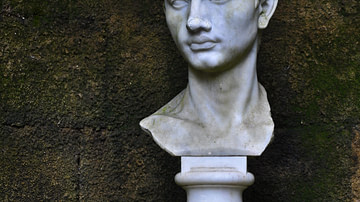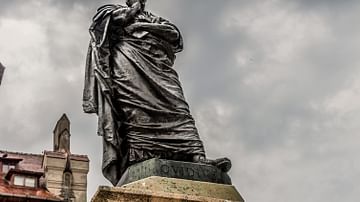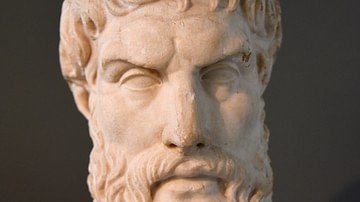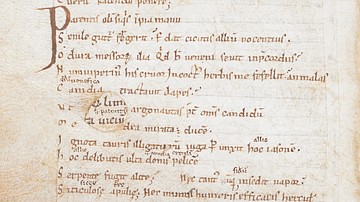
Quintus Horatius Flaccus (65-8 BCE), better known to most modern readers as Horace, was one of Rome's best-loved poets and, along with his fellow poet Virgil, a member of Emperor Augustus' inner circle at the imperial palace. Despite his early allegiance to one of Julius Caesar's assassins during the early dark days of the civil war, Horace eventually became a close friend to the emperor and supported his attempts at moral reform, believing it brought new life to a suffering empire, a new golden age.
Early Life
Horace was born on December 8, 65 BCE, in the town of Venusia in Apulia, a region in southeastern Italy, bordering the Adriatic Sea. As an adult, he was described by the Roman historian Suetonius as being short and fat. His father was a freedman and small landowner in Venusia, working part-time as a public auctioneer or co-actor; historians disagree on whether or not he had ever been a slave. Suetonius added that his father may have been a 'dealer in salted provisions.' Obviously, Horace's father was capable enough to send the young poet to Rome and Athens (where he studied literature and philosophy) to complete his education.
It was while Horace was in Athens that he joined the army of Caesar's assassin Marcus Junius Brutus as a tribunus militum or military commander (a post normally held by a member of the equestrian class) against the heir apparent Octavian (the future Augustus). The assassin's forces eventually lost at the Battle of Philippi in 42 BCE, and this defeat left the impressionable Horace and many others with a bitter taste for warfare. Unfortunately, his support of Brutus cost him his family's property.
Despite having supported Caesar's assassin, Horace returned to Rome where he was fortunate to procure a position in government as a scriba quaestorius, an accountant or cashier, working under a quaestor in the imperial treasury. Some question whether or not he actually held the position having opposed Augustus at Philippi, nevertheless, Suetonius claimed he was pardoned and purchased the position. It was at this time that Horace wrote his first series of poems, something that brought him into contact with both Virgil, the author of the Aeneid, and the poet Varius Rufus, the author of De Morte, a poem intended to comfort men and not to fear death. Rufus was a devout follower of the philosopher Epicurus and his school 'The Garden.' Horace was drawn to the Epicurean philosophy and its principle that pleasure was the only good. According to historian M. Beard, both Virgil and Horace represented 'memorable and eloquent images' of the new 'golden age' of Rome. In the words of historian N. Rodgers, Virgil, Horace, and the banished poet Ovid created a classical style that many believed was comparable to that of the ancient Greeks.
protégé of Maecenas
Luckily for Horace, Virgil and Rufus introduced him to a man who would have a profound effect on his life, Gaius Maecenas. Maecenas was a wealthy Roman and patron of the arts who gathered around him a circle of young poets. He was not only an author himself but a personal friend and advisor to Augustus, and through him, Horace would meet the emperor. The young poet soon became a favorite of Maecenas, eventually giving him an estate in the Sabine Hills near Rome at Tivoli. It was a place where Horace, having become financially secure, would eventually build a villa.
In keeping with the Epicurean philosophy, Horace's poems demonstrated a joy for life and a love of nature. Published around 30 BCE when he was around 35 years old, the Epodes or Iambi were 17 elegiac poems, many of which were written before he met Maecenas. The poems alluded to Octavian's victory at the Battle of Actium and his defeat of both Mark Antony and the Egyptian queen Cleopatra. The poems not only speak of politics but also of love and his admiration for the rural way of life. N. Rodgers quoted him as saying, "Happy the man who far from business ploughs again his ancestral lands" (385).

The Epodes were soon followed by the two books of the Satires, also called the Sermones or 'Conversations.' Besides a criticism of the vice that was rampant in Rome, he wrote of a journey he took with Maecenas to Brundisium and the resettlement of the civil war veterans. Some view the poems as autobiographical, containing poems as tributes to Maecenas and Horace's father.
Poetry & Philosophy
Although poorly received, Horace's next work was the three books and 88 poems of the Odes. These lyrical poems celebrated Rome in the age of Augustus. After their publication, the emperor would encourage the poet to write a fourth book of 15 poems. Horace said the poems were hymns to the gods and modeled after the great Greek authors, among them Alcaeus, Sappho, and Pindar. Horace always had a deep respect and admiration of the Greeks and believed Rome had to recognize the Greek superiority in all intellectual and cultural fields. In these poems he again praised Augustus for his victory at Actium and for bringing peace to a troubled people, restoring the lost customs and morality of the city's past.
However, there were those who considered Horace to have a romantic side. Although a life-long bachelor, he seemed to respect commitment. This is evident in Poem 13 in Odes Book 1:
Three times blessed and more are they
who are united with an unbroken bond;
no wretched quarrels shall ever separate
our love before the final days of life.(Branyon, 29)
Although he wrote earlier in his Satires: "Love has two evils, war and then peace" (Branyon, 109).
In his next two books, the Epistles, Horace turned away from poetry momentarily and turned to a philosophic reflection, writing on the right way of life. Published around 21 BCE, the first book was a series of letters written to a variety of individuals, telling of the circumstances of his own life and offering counsel. In the second book, Ars Poetica, Horace wrote on the art of writing poetry. About his own difficulty in the writing of poetry, he wrote, "Struggling to be brief, I become obscure" (Ars Poetica, Line 25) He also penned two letters, one to Augustus and one to his fellow Roman poet Publius Annius Florus.
Later years
Over the years the emperor and Horace had become very close; the emperor called Horace his 'little charmer.' In 17 BCE Augustus asked him to write a secular hymn commemorating the 800th anniversary of Rome's founding. Augustus also asked him to join his staff to help draft correspondence, but the poet declined. On this request, Suetonius wrote that due to poor health and demanding workload, the emperor appealed to Maecenas to let Horace come to the palace to 'help him write his letters.' On November 27, 8 BCE Horace died, two months after his life-long friend Maecenas, and was buried near his tomb. Despite legislation enacted by the emperor against bachelorhood, Horace never married, and so, according to Suetonius, Augustus was named as heir of his estate.







